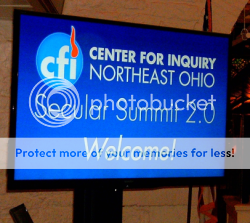
Secular Summit 2.0 Welcome Sign Greeted Participants
On January 28th, a bitterly cold Tuesday morning, approximately 20 people gathered for the second annual Secular Summit in the Museum Gallery in the Ohio Statehouse in downtown Columbus. The summit was organized and hosted by the Center for Inquiry Northeast Ohio (CFI NE Ohio) but included people from the various secular groups in Ohio. In the morning we had several speakers, some training in lobbying, and then the afternoon was when participants visited their Representatives and Senators to introduce themselves and the issues of importance to seculars in the state. The extreme cold couldn’t keep us from talking to the legislature, most of whom have completely opposite views.
The Secular Summit was held in the Museum Gallery on the ground floor of the Ohio State House.





